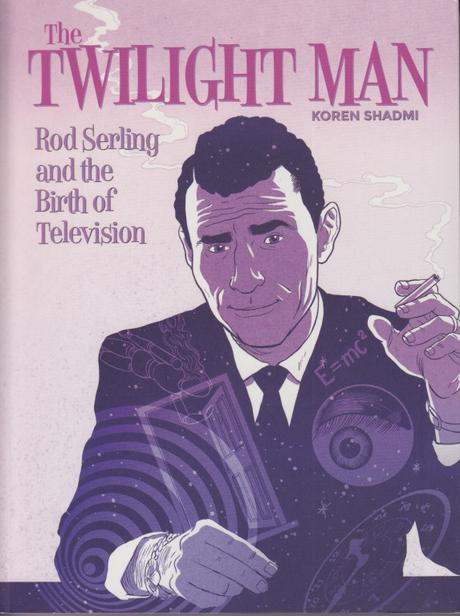
Graphic novels still feel like cheating. That childhood message that comic books “aren’t really reading” has proven difficult to dislodge. That, and the fear that we are entering a post-literary world, keep me from reading many of them. Koren Shadmi’s The Twilight Man: Rod Serling and the Birth of Television, however, caught my attention right away. Like many other people my age, my thinking was heavily influenced by The Twilight Zone. As a kid, television had a kind of authority to it. This is what adults were feeding us. Although I was hardly intellectual then, I thought deeply about things and one of those things was The Twilight Zone. The episodes were profound. The twist endings certainly were among the best on the tube. Shadmi’s graphic novel of Rod Serling’s life is a tribute to the influence the man had.
For a graphic treatment, The Twilight Man is strangely affective (yes, that’s spelled correctly). I tend to shy away from hagiographies, and Shadmi’s treatment isn’t one. It does illustrate, however, how Serling fought against a commercialism that would eventually win out. Those who control the money control what we see. Granted, the democratizing influence of the internet has let competition arise from unseen quarters—there are young people who watch YouTube to the exclusion of television altogether—but few shows manage the impact that The Twilight Zone had when there were only essentially three large networks. Now we have so many choices that cultural reference points are rare. Those who’ve never seen it, at least for the time being, know what The Twilight Zone is.
This book is biographical, based on published biographies. There’s something about knowing, however, that the episodes actually happened. Being in combat (as Serling was) puts some people into their own kind of limbo. At least one person in my own family was irrevocably changed by fighting in a war. The remarkable thing is that Serling came out of it wanting justice for all people. The book even points out that he became a Unitarian, although it doesn’t dwell on that point. Some things, such as spiritual insights, are difficult to illustrate I suppose. I can see why Shadmi’s tribute receives good press. Graphic novels are a means of telling a story that moves people. I re-learn this each time I read one, which is something I rarely do. Now that I’m starting to explore this genre I’m perhaps learning to address my own prejudices. As long as there are still words to read.
